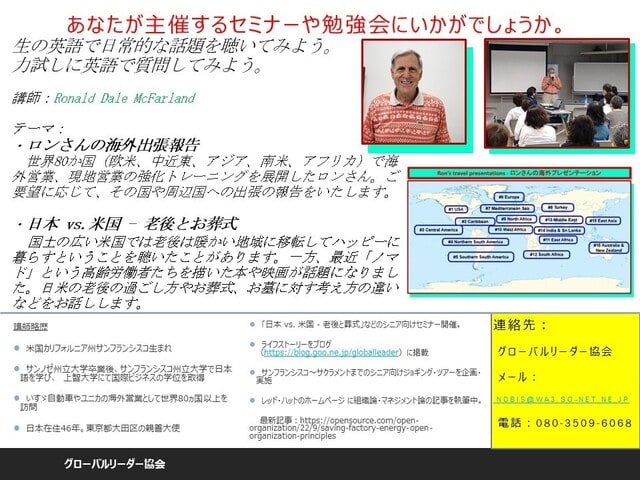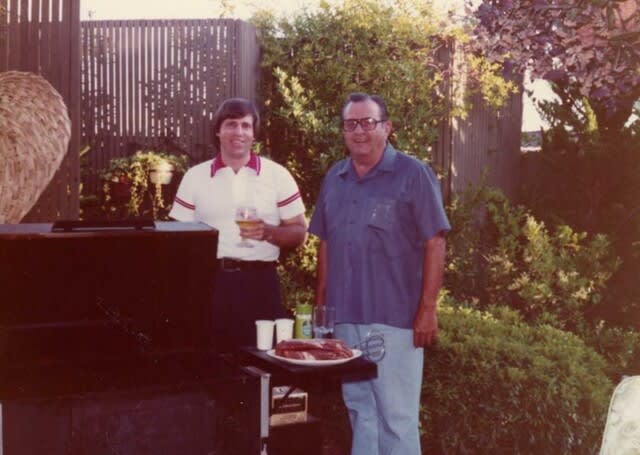学費の高いアメリカの大学。ローンを組んで学費を賄う学生も多く、卒業時には借金が1000万円を超える人も珍しくはないそうです。
ロンさんの学生時代、学費は今よりも安かったとはいえ、親からのサポートを期待できなかったため、やはりローンを組んでいたそうです。
それをバイトで早々に返済。スッキリ!ウールワースや軍隊での仕事などなど様々な経験がその後のキャリア形成に大いに役立ったようです。
As Japanese is not an easy language, people really appreciated my effort, particularly the Japanese people who were poor English speakers. They regularly gave me encouragement while my average American friends and my own family thought I was crazy.
With working at Woolworth’s 48 hours a week, the Army Reserves and Japanese, I found it all a bit much. Importantly though, I wiped out all the college debts and was single at the time, so I decided to quit working for Woolworth’s and moved up to Oakland.
Sam Fisk, whom I lived with in the Roger Williams house in San Jose while at San Jose State, was living in Oakland and going to school in San Francisco. His house there had a spare room I could rent. So, off I went. Interesting, Sam was going to graduate school at San Francisco State University, and just when he graduated, he went to Hawaii to work. That was 1-2 years before I moved to Japan. The year after I moved to Japan, my mother visited me in Japan, and on the way back to California, she stayed with Sam in Hawaii for several months. After that, she bought her own condominium in Hawaii and stayed there for 13 years before moving back to California. I visited Sam in Hawaii many times over the years while seeing my mother.
In Oakland, I set up my language classes over in San Francisco and worked part-time for another person who lived in the house. He had his own business selling computer data input services. Basically, it was asking companies if they needed help getting various data into their computers. He hired ladies to punch in the data and took a commission on the services he could sell to companies. I did that direct selling for him too. I learned I enjoyed outside selling even though I did it for only around four-months. I only brought in one account, Macy Department Store in San Francisco. That experience would help me years later when I had to write a sales training program.
Ronさんのセミナーいかがですか。苦労の多かったRon-sanの青春時代やキャリア形成の話、特に何故日本に来る決断をしたのか、などを聴いてみたいですね。それとRonさんが楽しみにしている出席者と皆さんとのノミニケーション。年末にはできそうですね。
皆さんがおやりになっている勉強会などに出張し講演させていただきます。
ただし、Ronさんが住んでいる東京都大田区から日帰りできるところとさせてください。
もっとも台湾でも日帰りは可能ですが。

ロンさんの学生時代、学費は今よりも安かったとはいえ、親からのサポートを期待できなかったため、やはりローンを組んでいたそうです。
それをバイトで早々に返済。スッキリ!ウールワースや軍隊での仕事などなど様々な経験がその後のキャリア形成に大いに役立ったようです。
As Japanese is not an easy language, people really appreciated my effort, particularly the Japanese people who were poor English speakers. They regularly gave me encouragement while my average American friends and my own family thought I was crazy.
With working at Woolworth’s 48 hours a week, the Army Reserves and Japanese, I found it all a bit much. Importantly though, I wiped out all the college debts and was single at the time, so I decided to quit working for Woolworth’s and moved up to Oakland.
Sam Fisk, whom I lived with in the Roger Williams house in San Jose while at San Jose State, was living in Oakland and going to school in San Francisco. His house there had a spare room I could rent. So, off I went. Interesting, Sam was going to graduate school at San Francisco State University, and just when he graduated, he went to Hawaii to work. That was 1-2 years before I moved to Japan. The year after I moved to Japan, my mother visited me in Japan, and on the way back to California, she stayed with Sam in Hawaii for several months. After that, she bought her own condominium in Hawaii and stayed there for 13 years before moving back to California. I visited Sam in Hawaii many times over the years while seeing my mother.
In Oakland, I set up my language classes over in San Francisco and worked part-time for another person who lived in the house. He had his own business selling computer data input services. Basically, it was asking companies if they needed help getting various data into their computers. He hired ladies to punch in the data and took a commission on the services he could sell to companies. I did that direct selling for him too. I learned I enjoyed outside selling even though I did it for only around four-months. I only brought in one account, Macy Department Store in San Francisco. That experience would help me years later when I had to write a sales training program.
Ronさんのセミナーいかがですか。苦労の多かったRon-sanの青春時代やキャリア形成の話、特に何故日本に来る決断をしたのか、などを聴いてみたいですね。それとRonさんが楽しみにしている出席者と皆さんとのノミニケーション。年末にはできそうですね。
皆さんがおやりになっている勉強会などに出張し講演させていただきます。
ただし、Ronさんが住んでいる東京都大田区から日帰りできるところとさせてください。
もっとも台湾でも日帰りは可能ですが。




















